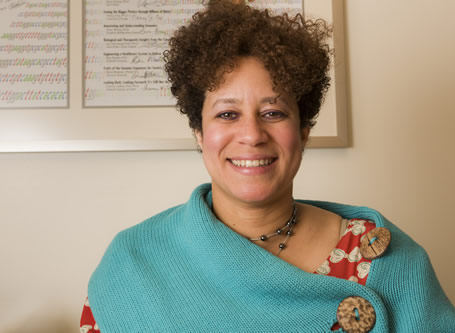Last updated: January 14, 2015
Carla Easter to lead NHGRI Education and Community Involvement Branch
Carla Easter to lead NHGRI Education and Community Involvement Branch
By Raymond MacDougall
Associate Director of Communications, Division of Intramural Research
 |
Carla Easter, Ph.D., a biologist and science educator, has been named chief of the National Human Genome Research Institute (NHGRI) Education and Community Involvement Branch (ECIB). The branch is a part of NHGRI's Division of Policy, Communication and Education (DPCE). She will lead the division's program of genomics education and outreach activities that engage a variety of communities, from pre-college students, to teachers, to members of the general public.
"Dr. Easter is an innovator and champion of science education outreach in and out of the classroom," said DPCE Director Laura Lyman Rodriguez, Ph.D. "I am confident that she will be a dynamic leader for the branch in its varied and important genomics education and public engagement activities."
With its seven-member team, ECIB develops education and community engagement programs to enhance the public's understanding of genomics and accompanying ethical, legal and social issues. Its partners have included high schools, universities, museums and libraries. Last spring, the branch developed a community engagement program with the Brooklyn Public Library in Brooklyn, New York, exploring the life of Henrietta Lacks, and in the summer convened a joint symposium on Native peoples and genetics with NHGRI, the National Congress of American Indians and the National Museum of the American Indian. Notably, for the past three years, ECIB spearheaded NHGRI's partnership with the Smithsonian's National Museum of Natural History to present Genome: Unlocking Life's Code, a travelling science exhibition.
"The partnership with the National Museum of Natural History on the genomics exhibition has been a fantastic experience," said Dr. Easter. "It's exciting to think about opportunities for outreach in the next several years, not just through the exhibition, but also through the website and activities that we have planned." The exhibition website is www.unlockinglifescode.org.
ECIB also develops resources for the public, such as the online Talking Glossary of Genetic Terms in English and Spanish, and has a history of bringing science faculty to NHGRI for a week-long summer short course in genomics. In addition to informing the public of the latest advances in genomics, ECIB promotes understanding genomics and its translation to health and society among diverse communities. Forging relationships with local schools is among Dr. Easter's favorite efforts.
"Working with students has been a fantastic experience and has continued to be a passion for me," she said. Among many activities for students, she has arranged one-on-one shadow day experiences at the NIH Intramural Sequencing Center for high school students from Prince Georges County and Montgomery County. "Listening to their excitement and experiences at the sequencing center has been wonderful. Their enthusiasm after having an opportunity to observe in an NHGRI facility makes me want to come up with more experiences we can create for students."
Dr. Easter holds a Ph.D. in biology with an emphasis in molecular genetics from the University of California, San Diego. She completed a post-doctoral fellowship at the Washington University School of Medicine in St. Louis, Missouri, and spent a subsequent year coordinating educational programs for the Quality Education for Minorities Network in Washington, D.C.
With a deepening interest in science education, Dr. Easter began a fellowship in a new program at Washington University's Department of Education. Here, she pursued a research project at a local high school, exploring the notions held by ninth and tenth graders about success in science courses and gaining scientific knowledge.
"Many of the kids who were successful in science weren't in love with science, but they knew what they needed to do to be successful students," she explained. "We have this misconception that the kids who don't do well in the classroom don't like science, but that is not always the case. They may gain knowledge of science in different ways." She continually seeks opportunities that will help every student become successful in science.
In 2003, just as the Human Genome Project was being completed, Dr. Easter joined the Genome Institute at Washington University. During her tenure in this position, she directed minority outreach as part of an NHGRI-funded Diversity Action Plan program, which helped to enhance diversity in the scientific workforce, as well as increase the public's knowledge of genomics and its relevance to human health. "It was an exciting time, not just from the scientific perspective, but for efforts being made to get information out to the public about the human genome," she said.
A signature of ECIB programs - and Dr. Easter's own efforts - are activities in which members of NHGRI's scientific community present interactive demonstrations or answer scientific questions in ways everyone can understand.
"I hope to increase the access people have to genomic information, whether that is through public engagement or through activities we do with teachers and students," she said. "I never get tired of seeing the wonder and awe on people's faces when we do strawberry DNA extraction demonstration and they say, 'This slimey, gooey, snotty stuff actually is DNA?' It proves to me that no matter their age, people are awed by science."
Posted: January 14, 2015